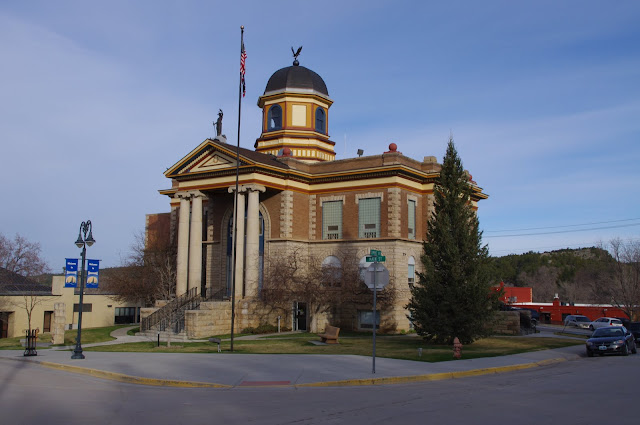Weston County, Wyoming, courthouse.
The Justice Department has sued California to block new congressional district boundaries approved by California voters last week.
It's leaving the Texas crap districts alone, however.
In Utah, a Court blocked an effort to prevent their new commission designed districts, which features, gasp, a Democratic seat.
Cont:
Trump ordered the Justice Department to investigate links Jeffrey Epstein had to prominent Democrats and institutions including former President Bill Clinton and former treasury secretary, Larry Summers. Read as he bounces off the wall in panic like a grade school dodge ball. Bondi, of course, a loyal sycophant, appointed a prosecutor.
November 15, 2025
Wyoming Supreme Court Pauses Judge's Order For More School Counselors, Computers
November 17, 2025
Two well known names from the state's Republican politics.
December 4, 2025
Family of Colombian man killed in U.S. strike files human rights challenge
December 5, 2025
Headline in CST:
Court allows Texas maps
A Federal grand jury declined to indict New York Attorney General Letitia James on mortgage fraud.
December 12, 2025
The DOJ failed a second time to indict Letitia James
cont:
The National Trust for Historic Preservation has sued to stop construction of the giant White House ballroom.
December 16, 2025
December 18, 2025
December 29, 20205
Sued For Defamation, Former State Senator Says WyoFile Should Be Sued Too
December 31, 2025
Deposition testimony of Jack Smith.
From the deposition:
President Trump was by a large measure the most culpable and most responsible person in this conspiracy. These crimes were committed for his benefit. The attack that happened at the Capitol…does not happen without him.
January 6, 2026
The big news, of course, is that an illegitimate foreign head of state has been indicted in the United States brought here in a raid by an illegitimate head of state who has experience with the criminal justice system himself.
Total bogosity.
In other news, and in more bogosity of a sorts, the National Rifle Association is suing the NRA Foundation, a trust that benefits the NRA in what partially can be attributed to an ongoing inter NRA feud.
That things were going wrong at the NRA was pretty evident for quite some time. Things are still going wrong at the NRA. The organization was run for decades by Wayne LaPierre who followed in the footsteps of Haron Carter in fundamentally changing the organization.
Carter rose to power in the organization in 1977. Prior to that date the organization had been agnostic on gun control. Following that it moved to being an ardent opponent.
It was under Wayne LaPierre, however, that the organization became radical, frequently using extreme claims to raise funds. His personal life a bit of a mystery, but he was undoubtedly successful in building up the NRA which became effectively a fundraising arm of the Republican Party, which it remains in spite of LaPierre's fall in a corruption trial. While LaPierre is gone, the current NRA maintains the script, even though its numbers are falling dramatically off. It will, for instance, no longer issue a print edition of the American Rifleman starting this year.
What exactly this trial entials I don't know. It'll be interesting to watch. It's already accused the Foundation of being run by the disgruntled.
At any rate, while NRA concerns about gun control were well placed into the 1990s, the supposed threats they posed were really waning by late in that decade and the organization has been crying wolf for years. Gun owners know that and have been dropping out of it, tired of the message that Stalingrad is right around the corner. Moderate Republicans who are horrified by Trump have not been impressed with NRA's ongoing drumbeat for him. The LaPierre tactics that lead to its rise, and fall, foreshadowed the rise and tactics of MAGA to some degree, and like a lot of things touched by Trump, the organization appears to be dying. In recent years, it's support for Trump have lead to claims of hypocrisy by some on the left.
A sad thing is that the NRA really does do some very important firearms work. It supports shooting programs, matches and range safety in a major way. There's nothing to replace it in these areas.
January 8, 2026
Wyoming Attorney General To Ask For One Last Chance To Defend Abortion Bans
January 10, 2026
Weston County clerk subpoena was valid, court filings argue: The Natrona County District Attorney maintains the Wyoming Legislature was acting in its legal authority.
Odd news here:
Casper Man Pleads Guilty To Making Violent Threats Against Jewish Organization
January 13, 2026
Sen. Mark Kelly has filed a lawsuit Monday seeking to reverse Defense Secretary Pete Hegseth’s letter of censure and effort to potentially demote him. Kelly will win the suit.
January 17, 2026
I have to wonder if this:
Will influence the United States Supreme Court, which is about to rule on the legality of Trump's tariffs. A sane ruling would strike them down as illegal. If they were thinking of supporting them, as of right now they knew that Donald Trump is Bat Shit Crazy and ought to be reined in with a curb bit until he gags.
He's nuts.
Maybe this will influence the Court.
February 18, 2026
Last edition:












